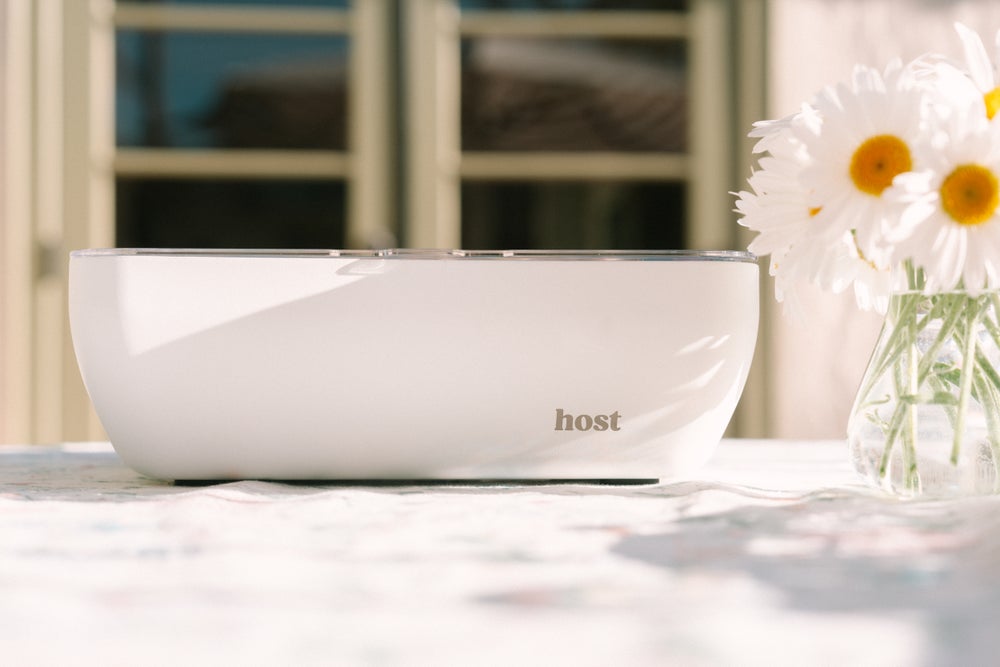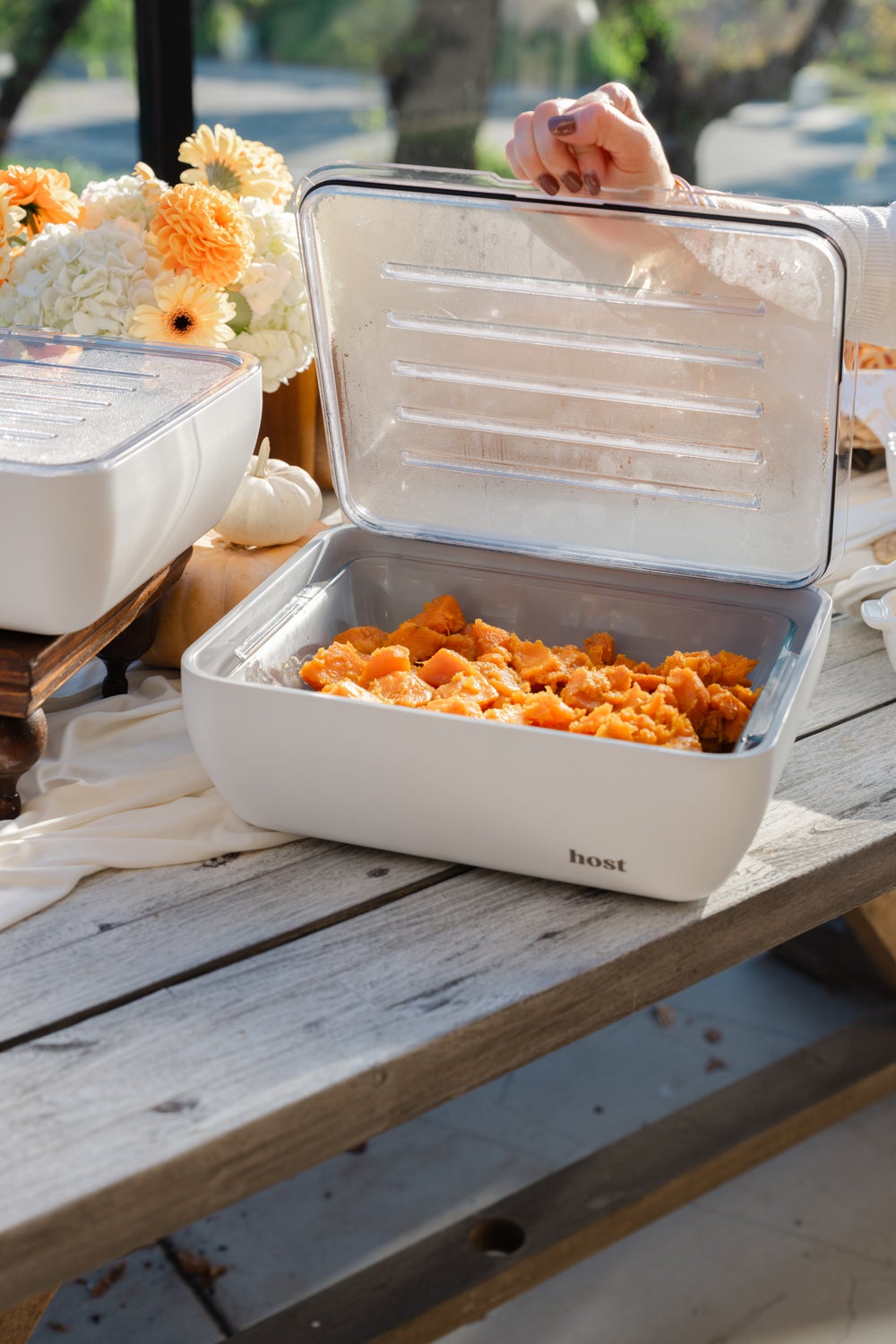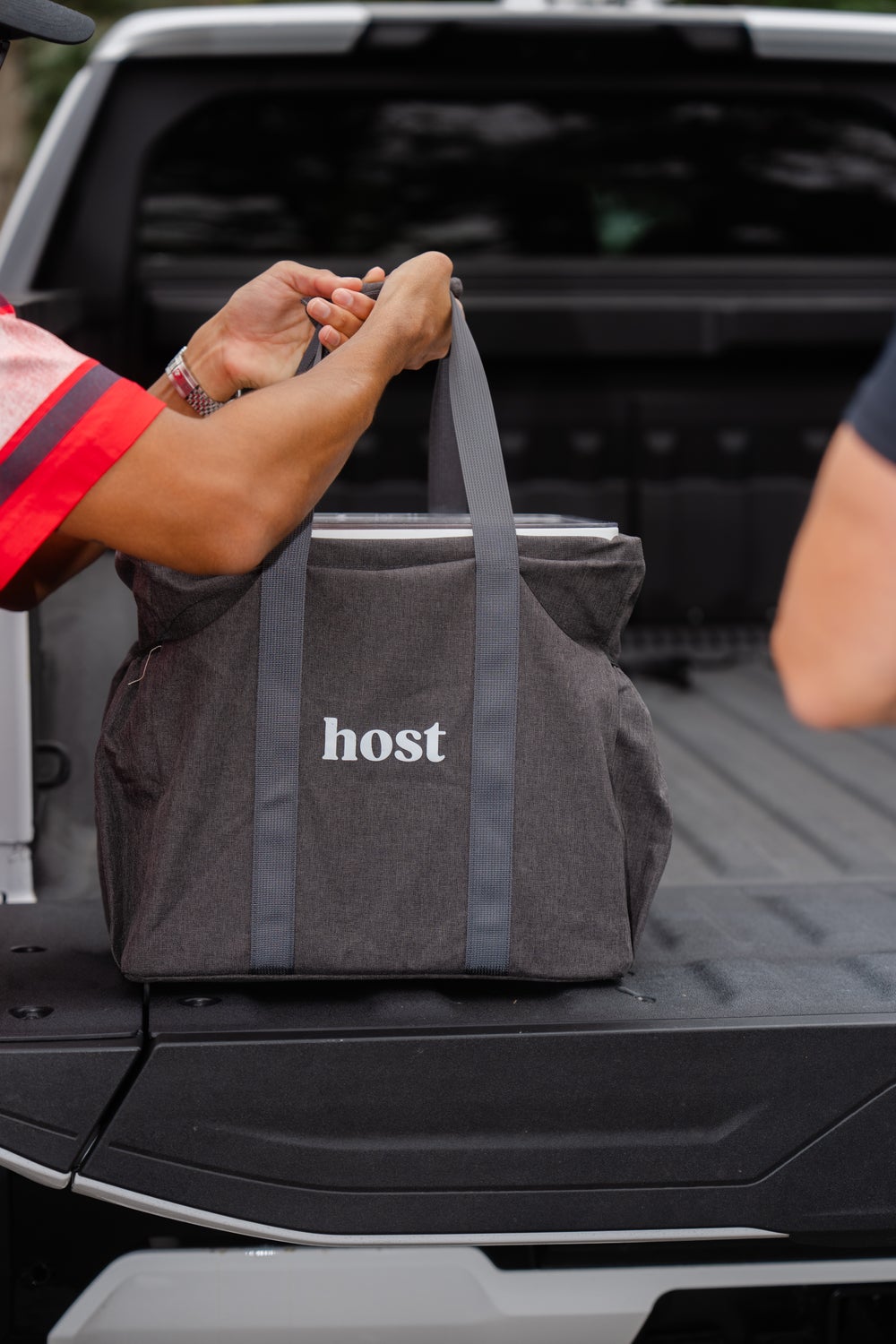Key Takeaways
- Coyne wondered why there wasn’t a thermal container that could keep large dishes warm on the market.
- He and his brother-in-law, Collin Duff, launched their second venture, Host Modern, to bring the product to life.
- Some key lessons learned from building their previous DTC golf brand, Stix, helped along the way, Coyne says.
As a father of four boys of various ages attending different schools, Gabe Coyne faced a common predicament in the mornings: It was difficult to keep breakfast warm for everyone across the 90-minute departure period.

Image Credit: Courtesy of Host Modern. Gabe Coyne.
“I had the option to make breakfast once, and only the first kid got hot food, or make breakfast three different times,” Coyne recalls. “All the while, I’ve got my Yeti thermal coffee tumbler that’s keeping my coffee hot until lunch. I was like, Why don’t I have this for food?“
Coyne was already well-versed in building brands. He ran a creative studio in Seattle, Washington, for about a decade before one of his clients recruited him to be a technical co-founder in his startup. Then he joined a venture studio where he focused on digital products. After that, in 2019, he and co-founder Collin Duff started the direct-to-consumer golf brand Stix Golf.
Related: Her Business Predicted a Gen Alpha Trend and Saw $100 Million in Sales Last Year
Coyne’s breakfast dilemma would lead him and Duff to partner on another venture in 2024: cookware and serveware brand Host Modern. Coyne is the company’s CEO, and Duff, who is also Coyne’s brother-in-law, is COO.

Image Credit: Courtesy of Host Modern
Coyne’s initial research for Host Modern revealed that double-walled, vacuum-sealed containers are the best thermal options on the market, yet no one had applied the technology to larger products.
A deep dive on some Reddit boards explained why: The containers would be heavy and not as durable as, say, a typical cooler taken camping — one dent or puncture would compromise the thermal layer.
“Never believe that if you build it, they will come.”
So Coyne opted to scale down a bit. One of his early concepts was a bento-box-like design: stackable circles.
However, as someone who prioritizes validation, testing and iterating before moving forward, Coyne solicited feedback — and received the same response from nearly every person: “Can I put my casserole dish in that?” Of course, because of the circular model, the answer was no.
Coyne didn’t want to launch a product without demand, and unlike some entrepreneurs who can’t let go of their initial vision, he wasn’t opposed to a pivot.
“So many people get so obsessed with their idea, or they think they have such a great idea and they immediately just go start building it like it’s going to be magic,” Coyne says. “Never believe that if you build it, they will come. Go make sure somebody wants that thing.”
Related: She’s Using 3 Revenue-Doubling Secrets to Grow Her Mother’s Decades-Old Business
Ultimately, the co-founders figured out how to make the casserole-sized dish happen, acknowledging that it was “more complicated” — but also a potential safeguard against copycats.

Image Credit: Courtesy of Host Modern
With a supplier in China secured and production underway, Host Modern launched a Kickstarter campaign in September 2024.
Host Modern hoped to raise $10,000 but significantly exceeded the expected demand. The campaign pulled in $120,000, and the business launched on Shopify by the end of the year — then saw another $600,000 in pre-order sales. Those pre-orders grew to $1.5 million before the product shipped the following spring, totaling $2 million in sales in just six months.
“We designed this business out of the gate to be optimal end to end.”
Some of the lessons learned from Stix helped pave the way for Host Modern’s strong start, Coyne says.
The golf brand has raised over $12 million, surpassed 75,000 sets sold and $50 million in revenue, and is growing more than 30% year over year, per the company.
When Coyne began with Stix five years ago, he came from a digital background and had no experience with physical goods or global manufacturing.
As a result, Coyne learned a lot about warehousing and delivering to customers. In building Host Modern, Coyne married that knowledge with his tried-and-true digital advertising playbook to capture an even larger market.
Recent estimates suggest that the golf equipment market is valued at about $7 billion, while the combined cookware and serveware market is roughly $43 billion, per Grand View Research.
What’s more, Host Modern’s lower price point — a $100 thermal serving dish versus a $1,000 set of clubs — appeals to an even wider swath of potential customers.
“[The product] is also smaller, so it warehouses and ships well,” Coyne adds. “So many things have been more efficient [this time around]. We designed this business out of the gate to be optimal end to end, from the cost of goods to the warehousing, digital marketing and the actual market we’re approaching.”
Related: My Business Tapped Into a Misunderstood Market and Made $760,000 in Year 1
The co-founders also learned a valuable lesson on SKUs with Stix, which at one point had up to 3,000 that had to be juggled effectively to maintain adequate stock. At Host Modern, they wanted to keep the product line manageable.
Host Modern currently offers its thermal serving dish, a carry bag and a glass baking dish.

Image Credit: Courtesy of Host Modern
When tariffs hit, having fewer SKUs worked in Host Modern’s favor, though it was still a significant hurdle. The business’s products were subjected to a 145% charge and didn’t avoid it on a single shipment. Still, the brand stayed lean on product and pushed forward.
“We started to open up new markets,” Coyne says. “Canada, Australia and the UK. But now, as you’re managing all this inventory, trying to stay in stock, you’re talking about maybe multiple U.S. warehouses, now international, trying to make sure all that in and out is flowing. That is a challenge, even with a couple of SKUs.”
“We have had to prepare inventory for a massive spike.”
With holiday dinners around the corner — a perfect use case for a thermal casserole dish — Host Modern expects to see a surge in demand. Of course, it doesn’t have historical data to forecast sales, but Google search trends, which also helped the co-founders anticipate sales at Stix in the beginning, seem promising.
“ We look at the casserole dish search term on Google Trends, and over the last five years, it goes crazy [during the holidays],” Coyne says. “The spike in November is 5x. So we don’t know exactly what to expect, but we have some guesses and have had to prepare inventory for a massive spike.”
Host Modern will also take advantage of the interest around Black Friday and Cyber Monday — though it won’t go so far as “Black November,” the co-founder notes.
”We want to maximize our ad dollars,” Coyne explains. “If there’s going to be a spike, [we want to] get it all while it’s at the ultimate peak rather than trickling in early.”
“We’re not a serveware company. We’re a hosting company.”
Coyne has always appreciated great hosts and the generosity and care that go into their events, and as he looks to the future of Host Modern, he anticipates the brand leaning into its name, which was intentionally chosen to leave room for a range of hosting-related products.
As the co-founders and their wives continue their own hosting traditions, Coyne is committed to making the experience easier and more enjoyable for both them and their guests — and sees Host Modern doing the same for others.
“ We have a couple of fun products in the pipeline, and it’s pretty broad,” Coyne says. “We’re not a serveware company. We’re a hosting company. So what are the biggest pain points of hosting? We’re going to solve those problems.”

